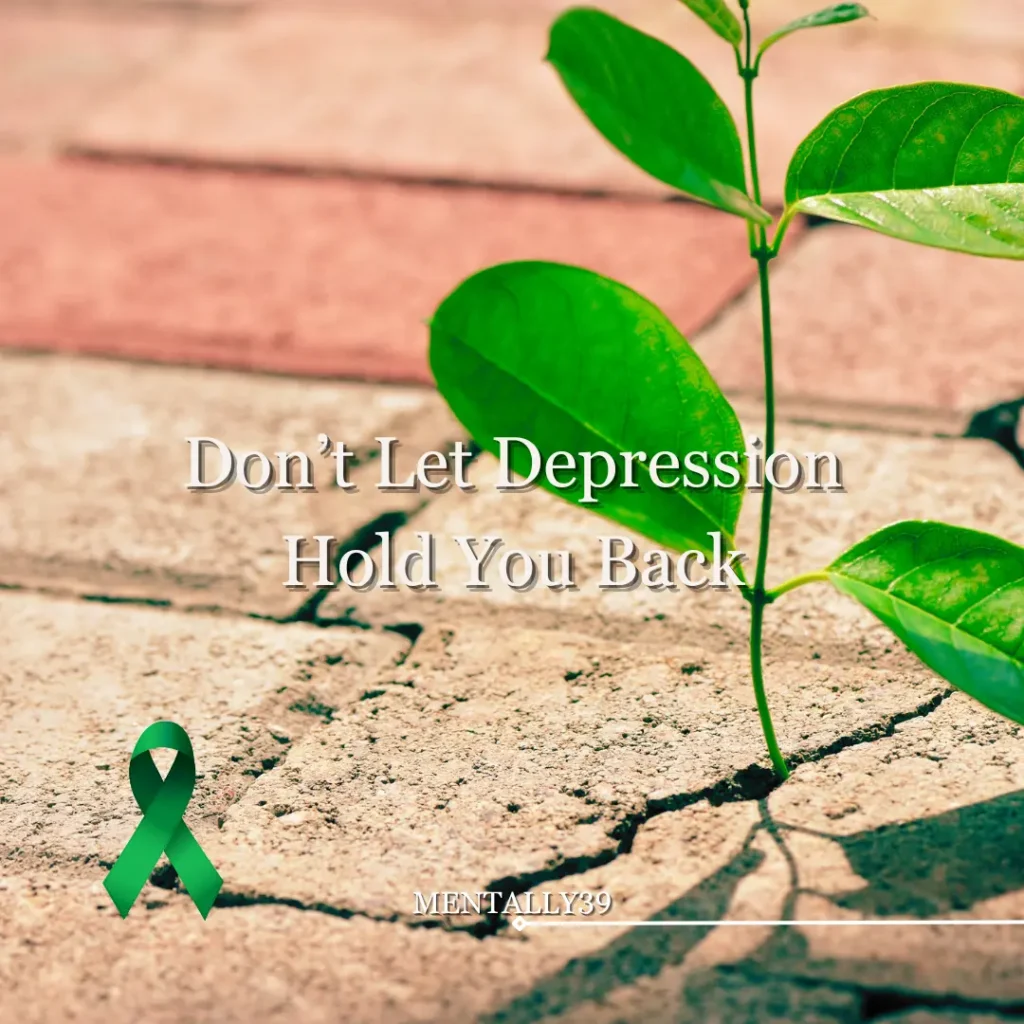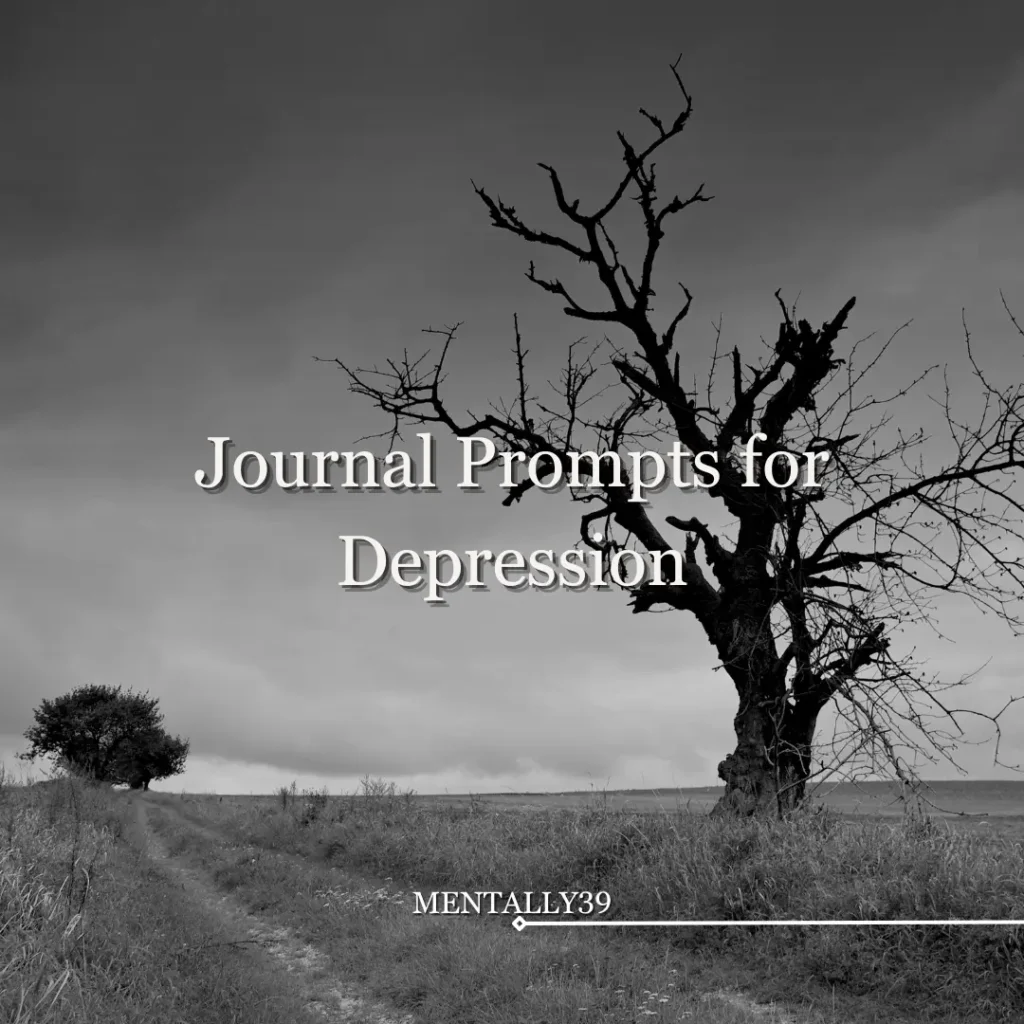This article contains a link which, if followed, I may earn a commission if you end up purchasing. This commission is used to keep mentally39 up and running
Journaling is a great tool that connects therapy with daily life. It helped me when I was going through alcohol rehab. It allows you to express your thoughts, feelings, and experiences on paper. I’ve also been using journal prompts for depression. I’ve made it no secret that I have had issues with alcohol and depression, both going back many, many years. Journaling is one method I learned to help me during recovery. This simple technique improves self-reflection and how we think, helping us understand ourselves better and manage our emotions. These prompts work well with therapy, strengthening the healing process and enhancing mental health.
Table of Contents
Understanding Depression
Depression affects many people worldwide. It’s more than just feeling sad; it also brings a deep sense of hopelessness and loss of interest in activities you once enjoyed. Depression can make it hard to handle daily life, impacting relationships and work.
People with depression may feel worthless, guilty, and tired most of the time. They often feel very isolated and disconnected from the world. It’s important to understand that depression is an actual medical condition that requires kindness, support, and effective ways to deal with it. Depression is on the rise since the COVID-19 pandemic. The World Health Organization reports a 25% increase in the prevalence of anxiety and depression worldwide.
The Power of Journaling
Remember that journaling is a great tool for people dealing with depression. Writing down your thoughts and feelings can help you release them and gain valuable insights into your mental state. Writing prompts can also lead you to discover more about yourself. By journaling regularly, you can uncover patterns, identify triggers, and work towards healing and personal growth.
Setting Up Your Journal
Remember to start by choosing a journal that resonates with you, whether a beautiful leather-bound notebook or a simple spiral-bound pad. Personalize it with stickers, inspirational quotes, or drawings reflecting your healing journey. Creating a safe and inviting space for your journaling practice is essential.
Create a quiet and comfortable space for journaling. Add soft lighting, cushions, and things that make you feel peaceful. Natural elements like plants or stones can also make the area even more calming. This intentional setup will help you see your journal as a safe place for self-expression and reflection.
Unique Journal Prompts for Depression
- Today, I felt___ because___
- Write about a place where you feel safe. Describe it in detail.
- What are three things that happened today that you can be thankful for?
- Reflect on a time when you overcame a difficult challenge. How did you do it?
- Create a list of activities that calm or energize you. How can you go into your day tomorrow?
- Describe your perfect day. What would you do from morning to night?
- Who are the people who support you? Please write a letter to one of them thanking them for their support.
- Identify a negative thought you had today. Can you reframe it into a more positive or realistic one?
- What is something about yourself that you feel proud of? It could be a trait, an achievement, or a challenge you’re working through.
- Imagine talking to your younger self. What advice or comfort would you offer?
- What’s draining your energy the most? Consider steps you might take to lessen its impact.
- Describe a recent dream or daydream. What might it say about your feelings or desires?
- Choose a quote that inspires you and explain why it resonates with you right now.
- What are the physical places, sounds, or sights that seem to boost your mood?
- If you could change one aspect of your life right now, what would it be and why?
- Write about a time when someone showed you kindness. How did it impact you?
- How does depression affect your daily life and decision-making?
- List five things you like about who you are as a person.
- What hobbies would you like to explore or revisit? Why do they interest you?
- Finish this sentence: “Right now, I need more___ in my life because___”
- Imagine you could give your depression a physical form. Describe what it would look like.
- Write about a goal you have, no matter how small, and the steps you can take to work towards it.
- Reflect on a recent trigger for your depression. What coping strategies did you use, and how can you build on them?
- Describe your ideal self-care routine. What activities or habits would be a part of it?
- If you could go back in time, what advice would you give your younger self about dealing with depression?
- Write about a person who has positively impacted your mental health. How did they do this?
- Imagine you’re writing a letter to someone who is also struggling with depression. What would you say to them?
- Describe a moment when you felt most connected to your inner strength or resilience.
- Make a list of things you’re grateful for, no matter how small or insignificant they may seem.
- Describe your “depression toolkit” – a collection of activities, resources, or support systems that help you cope.
- Reflect on the relationship between your physical and mental health. What steps can you take to nurture both?
- Imagine you could have a conversation with a historical figure who also experienced depression. What would you discuss?
- Describe your ideal daily routine or schedule that prioritizes your mental well-being.
- Create a “worry list” of things that are on your mind. Next to each item, write a possible solution or an acceptance statement.
- Journal about the physical sensations you experience when depression is at its peak. How does your body feel, and what small steps can you take to comfort it?
- Reflect on your relationship with social media and technology. How does it impact your mental health? Consider steps you could take to modify this relationship for the better.
- Write about a place where you feel safe and calm. Describe it in detail. Why does this place give you comfort?
- Write to your mental health professional describing in detail your feelings of depression when they are at their worst.
- Write or plan a trip where your goal is to relieve stress; where would you go? What would you do?

Overcoming Challenges
When you’re dealing with depression, it’s essential to be patient and understanding when you’re journaling. Some days, writing might seem complicated or overwhelming. During those times, start small by jotting down just one word or sentence.
Also, don’t hesitate to get support from loved ones or a therapist if you’re struggling. Remember that progress isn’t always in a straight line, and setbacks are a normal part of getting better. Look at each challenge as a chance to grow and learn more about yourself through journaling.
The Healing Process of Mental Health
As you work through your journal prompts, you will gradually notice a change within yourself. Your writing becomes a safe place to explore your emotions without judgment. Each word you write helps you heal and guides you toward inner peace and understanding.
By reflecting on your thoughts and feelings, you can start to understand and address the things that have been bothering you. Writing in a journal helps you face your inner struggles, leading to healing and personal development. As you continue to write, you’ll feel a sense of freedom, gaining clarity and renewed hope for the future.
And there are thousands of journal prompts for depression and anxiety, prompts for mental health, there are prompts for pretty much everything. Journal writing can help you improve your symptoms of depression or whatever else you have going on in your life. If it’s a medical condition, write about it. Work or career bothering you write, the goal is to improve your mental health. And remember, you are not alone!!!
20+ Years as a Special Education Teacher
NASM Certified Nutrition Coach,
Certified Trauma Informed Trainer
Mindset and Motivation Master Life Coach
